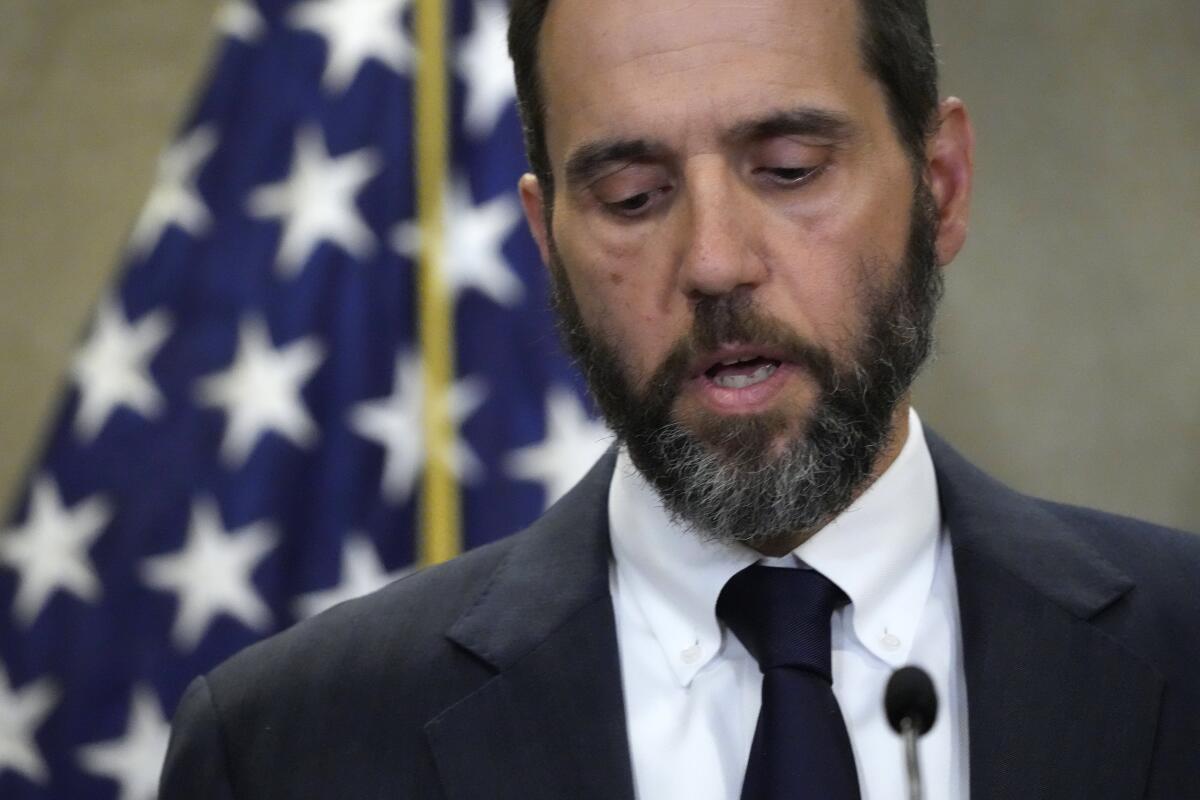Jack Smith’s latest push to get Donald Trump’s Jan. 6 trial moving before the election
Op-Ed,Election 2024
Harry Litman April 10, 2024
Special counsel Jack Smiths latest brief to the Supreme Court on Donald Trumps immunity claim strives to ensure that the justices’ decision puts the Jan. 6 trial back on track, ending the detour the former president has extracted from a weak argument.
The bulk of the brief Smith filed Monday is a methodical rejection of Trumps far-fetched claims to immunity from prosecution for attempting to overturn the 2020 election. Smith and his Supreme Court specialist, Michael Dreeben, closely follow the D.C. Circuit Court of Appeals persuasive, bipartisan opinion contradicting Trump on all points.
In the last few pages, however, Smith argues for the particular exigency of this case, noting that even if a former president has some immunity from federal criminal prosecution for official acts, this prosecution should proceed.
Smith contends that Trumps attempt to thwart the peaceful transfer of power is a paradigmatic example of conduct that cant be immunized. He describes whats alleged against the former president as a private scheme with private actors to achieve a private end namely, staying in power by fraud.
In what may be the briefs most consequential phrase, the special counsel insists that the case should be remanded for trial on the ground that whatever immunity the Constitution might provide a president, it cant shield Trump from this prosecution.
That would be dramatically different from the order that typically concludes a Supreme Court opinion. The justices normally set out governing principles of law and leave it to the lower courts to apply them to the facts, ordering a case remanded for proceeding consistent with this opinion.
The practical difference between such a standard remand and Smiths far more unusual proposed remand for trial may sound subtle. But its pivotal, as Smith and dozens of friend-of-the-court briefs recognize.
Smiths suggestion is a preemptive strike against an opinion that would leave room for yet another trip up and down the federal court system before a trial can begin, an opening Trump would surely exploit for further delay.
The all but certain ultimate answer to Trumps immunity claim is no: Under no plausible analysis will any court find that his conduct cant be prosecuted. But if it takes even a relatively quick series of further appellate reviews to nail that point down, it will probably squander any remaining possibility that this crucial trial will occur before the election.
The reason that the nature of the remand is a distinct risk in the case has to do with the question the court crafted for argument during the 13 days it took to act on Trumps petition for review. That extended period gave rise to speculation that some justice was writing a dissent. But it seems the justices were instead engaged in negotiating and formulating the question to be considered.
They settled on a somewhat convoluted construction asking whether and if so to what extent a former president enjoys immunity from criminal prosecution for potentially official acts. That strongly suggests that at least some of the justices are concerned that however weak Trumps claim to immunity might be, presidential immunity might be required in some cases. They may have in mind an attempted prosecution of a president for, say, bombing an adversary during a war or refusing to crack down on unlawful immigration. And they may want to cover that ground in the courts first ever consideration of criminal immunity even if it doesnt apply to Trump.
Whatever room the justices leave for theoretical presidential immunity, you can be sure that Trump will aver in the trial court that it precisely describes his case. Presumably U.S. District Judge Tanya Chutkan and the D.C. Circuit would make quick work of it, but in the federal courts, quick work can take a couple of months.
Given the importance of the trial schedule, the key practical question is whether the court focuses solely on Trump’s case or endorses immunity in other instances. Smith’s gambit is a fallback that would let the court order the trial to proceed even if its opinion extends to broader principles of immunity.
The oral argument could also expose a fundamental divide among the justices about potential immunity unrelated to Trumps conduct.That would suggest that the court will issue multiple opinions after engaging in a back-and-forth that would itself likely eat up several weeks.
The amicus briefs in the case divide along similar lines. The most prominent ones in Smiths favor advise the court to simply affirm the D.C. Circuits rejection of Trumps claim without venturing into possible instances of immunity that are not remotely presented here. The briefs on Trumps side tend to argue for some immunity in some cases, a result that would likely give rise to a more complicated remand.
To date, the court has not seemed very sensitive to the political imperative of a verdict that gives voters a piece of critical information before the November election: whether one of the candidates is guilty of a scheme to subvert the last one. That is in stark contrast to the courts obvious speed in deciding Trumps eligibility for the Colorado ballot before the states primary. And the court has shown similar haste in politically supercharged cases before, among them Bush vs. Gore.
The justices apparent indifference to the need for speed and clarity in this case is a shame. If they continue merely proclaiming the law as usual, letting the political chips fall where and, more importantly, when they may, it will be an unnecessary boon to Trump and a loss for the country.
Harry Litman is the host of the
and the
speaker series.





